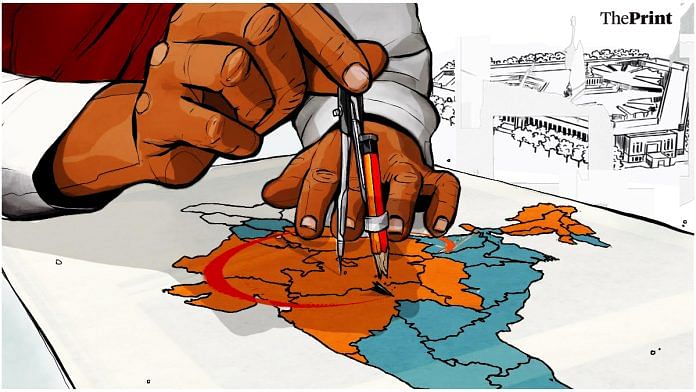In recent times, there has been a recurring debate on the salience of a North-South divide in contemporary India. From electoral outcomes to individual beliefs and practices, these two regions have often been described as starkly dissimilar. A common claim under this futile reductionist approach has been that while South India espouses rationality and secular modernity, the Hindi heartland remains preoccupied with orthodoxy and religious practices and customs.
However, empirical evidence belies this narrative. Analysing data from a national survey on religious beliefs and practices conducted by Pew International in 2020-2021 across India, we find that while there may be some differences in the incidence of specific rituals and customs, there is no evidence whatsoever suggesting a sharp divergence between North and South India. Evidently, religious practices among Hindus remain ubiquitous across the country.
In our analysis, we classify Bihar, Chhattisgarh, Delhi, Haryana, Himachal Pradesh, Jammu and Kashmir, Madhya Pradesh, Punjab, Rajasthan, Uttar Pradesh, and Uttarakhand as Hindi heartland states; and Andhra Pradesh, Karnataka, Kerala, Puducherry, Tamil Nadu, and Telangana as South Indian states. On various dimensions of religious practice and beliefs, we find limited differences between the North and South Indian states.
Also read: Clueless opposition cooked up a north-south divide—like tourists lost in their own country
Bridging the divide
First, a belief in God. Even in the South, atheism is limited to an acute minority (2 per cent). We find nearly universal belief in God among Hindus across both regions. In the survey, 99 per cent and 98 per cent of respondents respectively in the Hindi heartland and South India said that they believe in God.
While religion remains important for a vast majority of Hindus in both regions, the intensity varies. In the Hindi heartland, nearly nine out of 10 Hindus (89 per cent) said that they consider religion to be extremely important in their lives, compared to around two-thirds (68 per cent) in states below Andhra Pradesh.
Second, an integral aspect of everyday religious practice is praying at home. In the survey, nearly four-fifths (81 per cent) of Hindus in the Hindi heartland and more than seven out of 10 (72 per cent) in South India said that they did puja at least once a week. The figure in South India may be lower than the North, but it still indicates extremely high levels of religiosity.
Third, while South Indian Hindus may be slightly less likely to conduct puja at home, they are more regular in visiting temples. Nearly 62 per cent reported that they visited a temple at least once a week, compared to 57 per cent in the Hindi heartland. Interestingly, this difference is largely due to the substantially higher frequency of visiting temples among Dalits and OBCs in South India. For instance, 51 per cent of Hindu OBCs in the North reported visiting temples at least once a week, as compared to 60 per cent among the same group in the South. Similarly, a higher proportion of Dalits from South India reported regularly visiting temples.
Fourth, we find that more than four-fifths of households in both regions decided dates for important events such as marriage based on auspicious days and times. In fact, the proportion in the South (90 per cent) was slightly higher than in the North (84 per cent).
Finally, while a majority of individuals in both regions engage in religious fasting, its prevalence differs considerably. In the survey, 85 per cent of respondents from North India reported religious fasting, compared to a little over two-thirds (68 per cent) among South Indian Hindus.
While religiosity, in terms of engagement in various practices and customs, is similar across both regions, there are some striking differences in the importance attached to religion. For example, while nearly all individuals in North (98 per cent) and South (91 per cent) said that religion was either very or somewhat important to them, the salience of religion varies significantly in intensity. In the North India states, almost nine out of 10 respondents (89 per cent) said that religion was very important for them, as compared to a lower but still sizeable proportion in the South (68 per cent). Almost one-fourth of respondents considered it to be somewhat important.
In the British drama series The Crown on Netflix, the character of Queen Elizabeth II remarks to then-outgoing Prime Minister Margaret Thatcher how the critics have focussed more on their differences and have overlooked many things they had in common. Unfortunately, the same is true for people who bring up the religious North-South divide as a fundamental difference. While some degree of differences in religiosity between North and South or even across South Indian states are certainly undeniable, it would be erroneous to claim significant divergence between these two regions.
Pranav Gupta is a Doctoral Candidate in Political Science at University of California, Berkeley. Dr. Omkar Joshi is a Research Scholar at Department of Sociology and Maryland Population Research Center at University of Maryland, College Park. Views are personal and do not reflect the position of any organisation that the authors are affiliated with.




No body is saying that South India is less religious than North India. It seems to be an incorrect assumption and hence, in my view, the opinion seems to be irrelevant. The issue is that the Southerners seems to be more accommodative to minorities, religious beliefs of others, believes more in fraternity and the virtue of live and let live than the Northerners. What does the Pew survey indicate about these parameters?